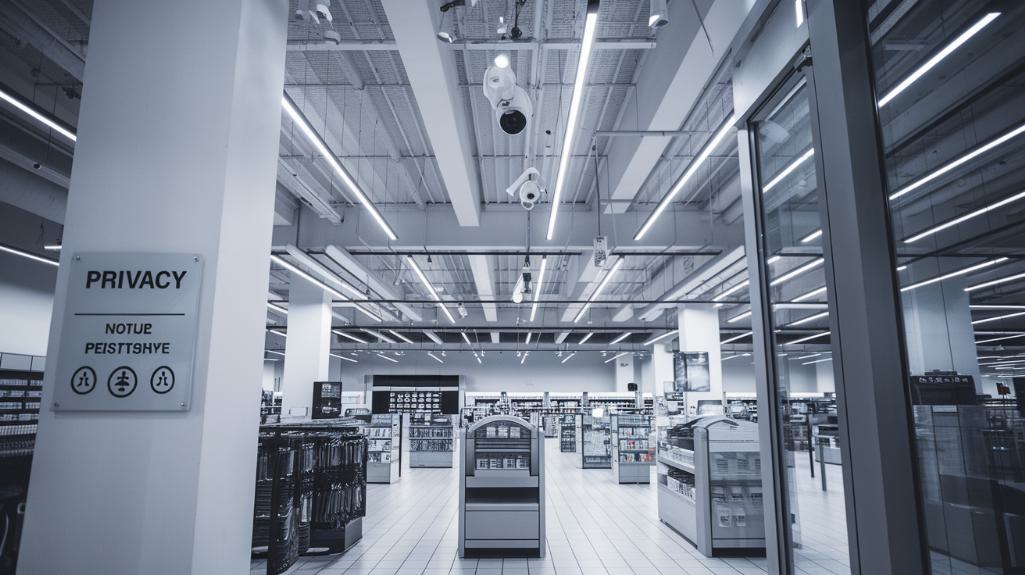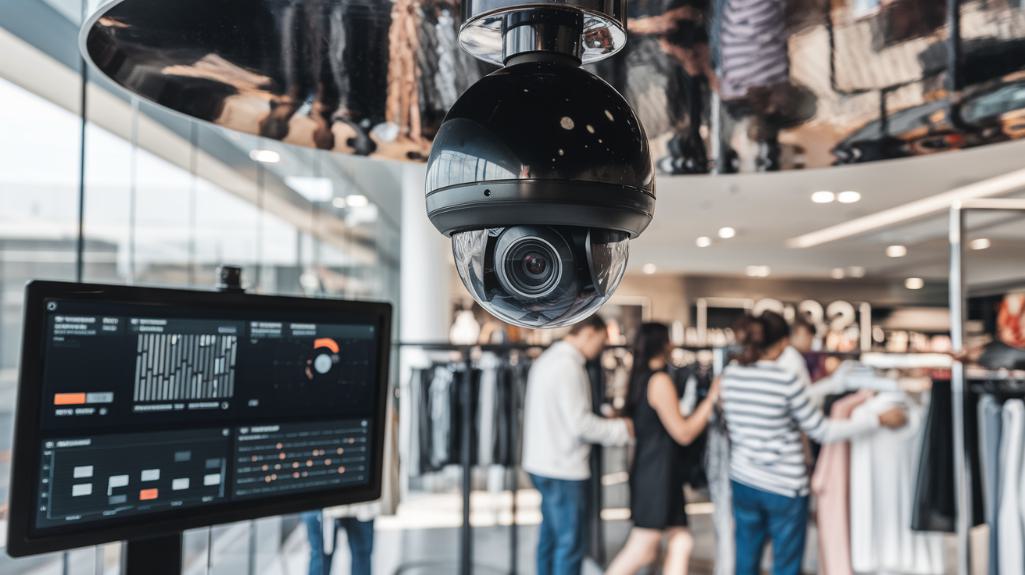Modern retail security technologies maintain legal compliance through integrated systems of data protection, automated monitoring, and regulatory controls. Organizations implement encryption, tokenization, and AI-driven solutions to meet requirements like GDPR, CCPA, and PCI DSS standards. Blockchain technology provides immutable audit trails while machine learning enables real-time compliance verification. Advanced compliance management frameworks reveal how these technologies work together to guarantee thorough regulatory adherence.
Key Takeaways
- Retail security systems employ encryption and tokenization technologies to ensure PCI DSS compliance when processing payment card transactions.
- AI-powered monitoring systems automatically track and adapt to changing regulations while maintaining detailed compliance audit trails.
- Video surveillance systems incorporate privacy controls and informed consent mechanisms to meet GDPR and CCPA requirements.
- Automated data discovery tools classify and protect sensitive customer information according to specific regulatory requirements.
- Blockchain technology provides transparent, immutable transaction records that satisfy regulatory documentation and verification requirements.
Understanding the Regulatory Landscape in Retail Security
While retail security technologies continue to evolve, understanding the complex regulatory landscape remains essential for businesses to maintain compliance and protect customer data.
Data protection laws like GDPR and CCPA mandate specific requirements for managing customer information, while PCI DSS establishes strict protocols for payment card security. Modern retail security technologies must integrate these compliance standards seamlessly.
Retail businesses must navigate complex data protection frameworks while ensuring their security systems fully align with regulatory requirements.
Video surveillance systems necessitate adherence to privacy regulations across jurisdictional levels, requiring informed consent and proper data handling protocols.
To address these challenges, automated compliance management tools provide systematic monitoring and documentation capabilities. Additionally, AI and machine learning enhance security measures through continuous surveillance and early threat detection, ensuring regulatory alignment while strengthening overall security posture.
This technological convergence enables retailers to maintain compliance while adapting to evolving regulatory demands.
Data Protection Technologies and Legal Compliance
Modern retail organizations must deploy extensive data protection technologies to maintain legal compliance across multiple regulatory frameworks. Data protection technologies facilitate adherence to standards like the Payment Card Industry Data Security Standard, GDPR, and CCPA through systematic safeguarding of customer information and transaction records.
Key compliance-enabling technologies include:
- Encryption and tokenization systems for secure payment processing
- Automated data discovery and classification tools for privacy law adherence
- Blockchain platforms for immutable transaction record-keeping
- AI and machine learning solutions for anomaly detection and monitoring
Automated compliance management systems support these technologies by generating thorough audit trails and enabling swift responses to potential violations.
This integrated approach guarantees retailers maintain continuous compliance while protecting sensitive data across their operations.
AI-Driven Solutions for Security Standard Adherence
Artificial intelligence-driven solutions have revolutionized retailers’ ability to maintain security standard adherence through automated compliance monitoring and real-time regulatory adaptation.
Machine learning algorithms continuously analyze transaction patterns and security practices, enabling proactive identification of potential compliance breaches before they escalate into regulatory violations.
These AI-driven solutions streamline compliance management by automating adherence to standards like PCI DSS and GDPR. The systems generate thorough audit trails while simplifying regulatory reporting requirements through automated workflows.
In addition, the technology facilitates real-time adjustments to evolving regulations, minimizing operational disruptions and resource allocation needs. By integrating AI within security frameworks, retailers enhance their data protection capabilities while greatly reducing risks associated with non-compliance fines and potential data breaches. Furthermore, AI-driven learning continuously adapts detection algorithms to new theft techniques, ensuring ongoing compliance with security standards.
Blockchain Implementation for Regulatory Requirements
Through its inherent characteristics of immutability and transparency, blockchain technology provides retailers with robust solutions for meeting complex regulatory requirements in the digital commerce landscape.
The implementation of blockchain architecture enables compliant management of transparent data while guaranteeing adherence to GDPR and CCPA standards for customer information protection.
Key compliance benefits of blockchain implementation include:
- Automated regulatory adherence through smart contract protocols
- Secure transaction records with immutable audit trails
- Enhanced fraud prevention through decentralized verification systems
- Verifiable supply chain documentation for product traceability
The technology’s distributed ledger framework establishes a foundation for maintaining regulatory compliance across multiple jurisdictions while streamlining security protocols.
This systematic approach to data management guarantees retailers can effectively meet evolving regulatory requirements while protecting sensitive customer information and transaction integrity.
Automated Systems for Real-Time Compliance Monitoring
Building upon blockchain’s foundational security framework, automated systems for real-time compliance monitoring represent a sophisticated technological advancement in retail security management.
These systems continuously analyze operational data against legal regulations, providing immediate visibility into compliance deviations and potential risks.
Through thorough monitoring capabilities, retailers can maintain adherence to evolving standards like GDPR and CCPA while generating detailed audit trails for compliance reporting.
Modern retail compliance requires robust monitoring systems to ensure continuous adherence to data protection regulations while maintaining comprehensive audit documentation.
The automated approach enables instant alerts when deviations occur, allowing organizations to implement corrective measures before issues escalate into regulatory violations.
Additionally, streamlined compliance management reduces administrative overhead, enabling retail operations to allocate resources more efficiently.
This systematic approach to monitoring guarantees transparency and demonstrates a commitment to maintaining regulatory standards across all operational aspects.
Frequently Asked Questions
What Is the Compliance Regulation for Retail?
Retail compliance regulations include PCI DSS, GDPR, CCPA, and HIPAA, requiring thorough risk assessment, customer data protection, surveillance systems, technology integration, fraud detection, and employee training for loss prevention.
What Is the Legal Compliance of Cyber Security?
Legal compliance in cybersecurity encompasses adherence to data protection laws, privacy regulations, and compliance frameworks through encryption standards, vendor management, incident reporting, employee training, and regulatory audits for risk mitigation.
What Is Information Security and Legal Compliance?
Information security combines data protection measures and security protocols with legal compliance through regulatory frameworks, privacy laws, risk management, compliance audits, data encryption, employee training, breach notification, and incident response procedures.
What Are Security Compliance Standards?
Security compliance standards establish regulatory requirements through security audits, compliance checklists, and risk management protocols, encompassing data protection, privacy policies, incident response, employee training, third-party vendor oversight, and compliance certifications.
Conclusion
Retail security technologies must maintain rigorous alignment with evolving regulatory frameworks while delivering effective protection measures. Through the strategic implementation of AI, blockchain, and automated compliance systems, retailers can achieve both security objectives and regulatory requirements. Continuous monitoring and adaptation of these technologies guarantee sustained compliance with data protection laws, privacy standards, and industry-specific regulations across global retail operations.



